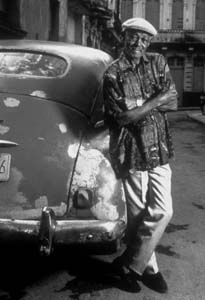![[Metroactive Music]](/gifs/music468.gif)
[ Music Index | Santa Cruz | Metroactive Home | Archives ]
Bittersweetly
How an old Cuban musician become a star
By Cynthia Adina Kirkwood
NATIONAL BOUNDARIES, whether they are bodies of water or lines on a map, don't block out music. In the Caribbean, musical forms travel freely from island to mainland and back to island again.
As the child of Belizean immigrants, I was weaned on the music played by the Buena Vista Social Club, whose namesake is a now-defunct Havana club where musicians often brought up the sun.
When I was growing up in the concrete village of a housing project in New York City, the sound of music and the aroma of food from Latin America, Europe, the West Indies and the American South filled the hallways. On weekends, my parents opened our two-bedroom apartment to family and friends who sought a break from the United States. They spent leisure time with people who understood what they said the first time, saw the world through their eyes and listened to the same music.
Eventually, we all sat down together to a meal that helped to assuage homesickness. The food--and the accompanying music--transported us back home faster and cheaper than any flight.
When I heard "Mandinga" on the CD Introducing Rubén González, I recognized the song from my youth, and from a tape recorded by Belizean musicians that I bought 10 years ago in a Belize City record shop. (Cuban pianist González, who was previously scheduled to perform as a guest artist with Orquesta Ibrahím Ferrer this Monday in Santa Cruz, has retired from touring and will not be appearing.)
Only five years ago, American guitarist Ry Cooder met Ibrahím Ferrer and the legends of the Buena Vista, whose talent had been largely forgotten. González's piano had been eaten away by wood worms; Ferrer's heart had been eaten by disillusion. The singer was shining shoes.
Yet, even without Cooder's support, without Wim Wenders' film Buena Vista Social Club, which showcases Ferrer and the recording of his album, and without the Grammy, I believe the music would have lived on.
"I pinch myself all the time," Ferrer once said. "It is a dream come true. When I was younger, I thought I was going to travel the world with my music. The only chance I got was when I came to Europe in 1962. Then there was the missile crisis. I played in Paris and Eastern Europe with Pacho Alonso's orchestra and then I was stuck in Europe. I had to stay until everything settled down again before I could go home. Then nothing happened for 35 years. This has given me the will to live. I'm living the dream of my youth in the body of an old man."
Here in the United States, where youth merchants sell creams, surgery and supplements to remove the vestiges of aging, the Buena Vista Social Club promotes Cuban elders who play music with the mastery of their years.
"The secret is the way we interpret the emotion in the music, which is the song's soul and anchor," 74-year-old Ferrer said. "People who don't understand the words still get the feeling. I'm always surprised to see young people moved so intensely by it. We old people are passing the sentiment and soul to youngsters who've never heard it."
Three years ago at an outdoor Water Festival concert I attended in Stockholm, Sweden, Ferrer and the Afro-Cuban All Stars, another Buena Vista Social Club, passed on the feeling to young and old alike.
On a warm summer night, Ferrer, in his trademark cap, seemed to stave off the darkness in the northern capital. He coaxed the standing audience to shiver, to dance and to cry. His controlled phrasing showed off the virtuosity of the horns, congas, timbales, piano, bass and everyone on stage. Ferrer and the other stars interpreted life for the audience in romantic boleros, the traditional Cuban son and rousing merengues, which originated in Haiti and the Dominican Republic.
Near the concert's end, he and Omara Portuondo, a diva wearing the colors of fire, dovetailed and tenderly married their voices in "Dos Gardenias." In the song, the flowers are his heart and hers; they hold the warmth of his kiss. The last verse: "But if one late evening, the gardenias should die, it's because they know you have betrayed me and that you love another."
Life--the sweet and the bittersweet braided together.
[ Santa Cruz | Metroactive Central | Archives ]
Copyright © Metro Publishing Inc. Maintained by Boulevards New Media.
![]()
 Vista View: It took 35 years, but Ibrahím Ferrer is living out his dream.
Vista View: It took 35 years, but Ibrahím Ferrer is living out his dream.
Orquesta Ibrahím Ferrer performs Monday, Jan. 14, at 8pm at the Civic Auditorium, 307 Church St., Santa Cruz. Tickets are $25-$65, available at the Civic Box Office or 420.5260.
From the January 9-16, 2002 issue of Metro Santa Cruz.